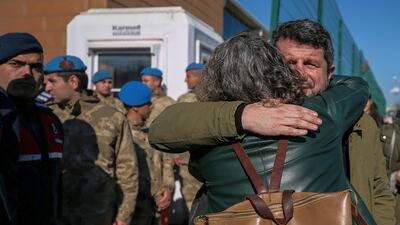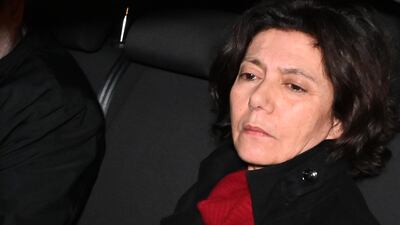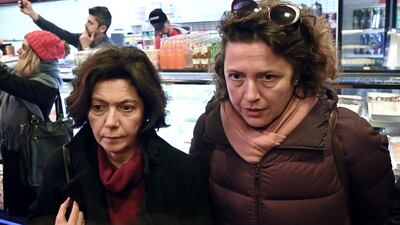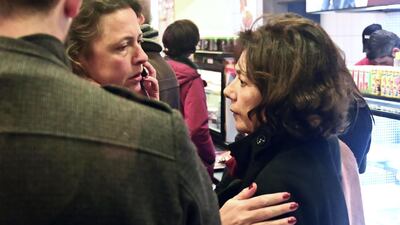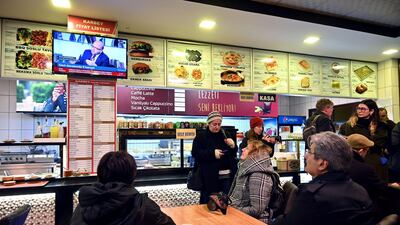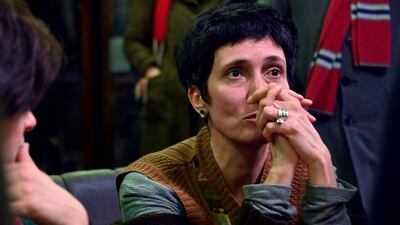Joy swiftly turned to sorrow for the supporters of philanthropist Osman Kavala this week as he was acquitted in a case that could have seen him jailed for life but was re-arrested in a stark illustration of what critics called Turkey’s drift from independent justice.
Mr Kavala was one of 16 defendants in the “Gezi Trial” — so-called because the charges stemmed from nationwide anti-government protests sparked by a bid to save Istanbul’s Gezi Park from development in 2013.
The acquittal of Mr Kavala and eight others led to scenes of celebration outside the court near Silivri maximum security prison on the outskirts of Istanbul.
However, within hours the city's chief prosecutor issued an arrest warrant for the 62-year-old head of Anadolu Kultur, a non-profit institution supporting peace and dialogue, over alleged ties to a 2016 coup attempt.
The Gezi defendants were accused of organising and planning the demonstrations, leading to charges of attempting or aiding an attempt to overthrow the government of then-prime minister Recep Tayyip Erdogan, who is now Turkey's President.
The remaining seven were tried in absentia and had warrants for their arrests revoked.
The acquittals came as a surprise for many and were welcomed by rights groups and international observers, but any hope they heralded of the revival of the rule of law was quickly squashed.
Nacho Sanchez Amor, the European Parliament’s Turkey rapporteur, initially welcomed the court’s decision but later commented that Turkey was back in a “dark period”.
Emma Sinclair-Webb, Turkey director for Human Rights Watch, called the decision “lawless and vindictive” and linked it to the case of Selahattin Demirtas, the former head of the opposition Peoples’ Democratic Party (HDP).
Both Mr Kavala, who was held in jail for 28 months prior to Tuesday’s hearing, and Mr Demirtas, who has been imprisoned for more than three years, have been subject to rulings by the European Court of Human Rights declaring their continued detention unjust and calling for their release.
However, separate charges that bypass the European court’s order now keep both men behind bars.
“The tactic applied to Kavala is not new,” Yaman Akdeniz, a law faculty member at Istanbul’s Bilgi University, said citing similar scenarios.
Referring to the date of the failed 2016 coup, he added: “Now the government, which survived the Gezi protests and reactions and the pressure of the European Court of Human Rights, will use the July 15 card to allow Osman Kavala to be detained again.”
Tora Pekin, lawyer for Mr Kavala’s co-defendant Ali Hakan Altinay, similarly described Mr Kavala’s re-arrest as a feature of Turkey’s justice system.
“Illegal and political arrests have become a sign of the judiciary today and this is the shame of the Turkish judiciary,” he said. “No one has the right or the authority to play with people’s lives in this way.”
The apparent conflicting decisions about Mr Kavala led some to suggest a struggle between competing factions in the justice system and government.
“The same was done against Demirtas so it shows that a very fierce struggle or fight between different wings in the state continues,” said Mithat Sancar, a law professor and HDP MP.
“There is a very strong fight within the state [that creates] a very dangerous situation that deepens the lines of conflict and tensions in society and destroys these institutions.”
Referring to a “mafia state” in Turkey, fellow HDP deputy Ahmet Sik, a former journalist who has also been jailed, added that the case demonstrated the “scale and magnitude of the conflict over power” within the judiciary.
Lisel Hintz, assistant professor of European and Eurasian Studies at Johns Hopkins University in the US, said it was “hard not to speculate that there are divisions within the judiciary, that Turkey wanted to signal democratic progress to its Western allies.”
She added: “What’s clear is that the new charges against Kavala can be seen as the continued constriction of the public sphere, as suppression and intimidation of civil society reflecting a politicisation and perversion of, at least part of, the justice system.”
